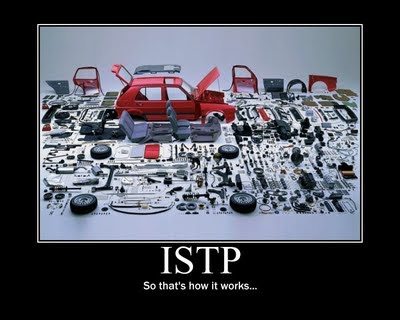Understanding ISTP “Laziness”
ISTPs get a bad rap sometimes for being ‘lazy’ or taking shortcuts in life. They’re seen as rule-breakers, rebels, and anti-authoritarian anarchists. Okay, maybe I’m stereotyping a little bit – the anarchist part might be going a little far. ISTPs often feel misunderstood and underestimated when it comes to their productivity simply because they have a different style of completing tasks than other types do.
Not sure what your personality type is? Take our new personality questionnaire here. Or you can take the official MBTI® here.

Why do ISTPs Get Labeled as ‘Lazy’?
ISTPs struggle with a combination of impulsiveness and procrastination. Why? Part of it has to do with the ISTPs dominant function: introverted thinking. Introverted thinkers like to pull everything apart and see it from multiple angles and learn all the details and data before making a decision. They like to keep things open-ended, and as such, can have trouble completing tasks. School and projects they find uninteresting they’ll often put off till the last minute.
Unlike the Te users (ESTJs, ISTJs, INTJs, ENTJs), Ti users like to see all the pieces of the puzzle before making a move. Te users, in contrast, like to move quickly once they have an idea in mind and don’t like deliberating over it very much. ISTPs may be impulsive about many things, in fact, they thrive on impulsiveness – however, if you want to get an ISTPs opinion on something or you want them to make a major decision, they’re going to wrestle with multiple perspectives and consider lots of information before giving you an answer.
This open-mindedness can give ISTPs the appearance of being laid-back or easy going. In fact, they may seem too laid back to other types. ISTPs don’t like to force their ideas on anyone else if they haven’t first thought about it from multiple angles. They don’t like to give an answer until they’ve considered its validity thoroughly. When they do speak, ISTPs are often very concise and direct – they are very economical with their words and will try to tell you as succinctly as possible what they want to say. Others may get frustrated with the time it takes for an ISTP to give an answer to an important decision, but they need to understand that ISTPs make decisions by looking at all the options first.
Hidden Thinking
ISTPs often keep all their strategizing, their planning, and their thinking inside. We don’t see all that. We see their actions – not their thought process. People with Te (extraverted thinking) show their thought process while Ti users internalize it. So what others may see as a “rash decision” may be something that the ISTP has been deliberating about, planning, and considering for some time. ESTPs may also struggle with this problem. My ESTP husband often felt frustration with this in his own life. People would see his action and deem it impulsive without realizing he had spent an enormous amount of time considering that action first.
In-The-Moment Living
Future deadlines, long-term goals and plans aren’t very motivating to ISTPs. If a teacher tells an ISTP to get their homework done by Tuesday at 8 AM, most likely the ISTP is going to be up on Monday night at 1 AM cramming. ISTPs live in the moment – they are the guys (or girls) you want around during a crisis. They’re quick thinkers with speedy reflexes and problem-solving skills, and as such, have made incredible warriors throughout history – think Miyamoto Musashi, the famed Samurai and author of ‘The Book of Five Rings’.
Personality expert David Kiersey said this about SP types “The Artisans’ self-respect depends upon their ability to act fearlessly, to look danger in the eye and defeat it under any circumstances. Boldness is a virtue to cultivate…With this eagerness to live boldly “up to that minute,” Artisans are the world’s greatest risk-takers. They delight in putting themselves in jeopardy, taking chances, facing hazards, whatever form their endangerment might take. Even if it means walking away from a good job or a settled life, they might very well pay that price.”
If you ask an ISTP to make a major commitment to something they may procrastinate for weeks, months, or years. If you’re going 75 mph down the highway and your brakes stop working, the ISTP will be the one to keep a cool head and grab the wheel. ISTPs have an in-the-moment intelligence and problem-solving ability that would astound most other types. In a crisis, the ISTP can make a snap decision that is usually very smart – but if you’re going to ask them where they want to be in ten years, don’t be prepared for a quick answer.
ISTPs and School
ISTPs are often highly intelligent, yet the daily grind of spending 8 hours at a desk listening and repeating back information is not their ideal learning environment. ISTPs are hands-on learners who do best with an active, fast-paced, visual education. They excel in the arts and crafts areas of school – and they can be great at math, but they don’t want to have to spend hours repeating the times tables and filling out paperwork. According to OddlyDevelopedTypes.com, psychologists rated ISTPs as one of the three types most likely to have trouble in school. A study found that they were over-represented in high school programs for at-risk students. They also have some of the lowest college retention rates.
Does this mean that ISTPs are not smart? On the contrary – ISTPs often have a vast, practical intelligence. Elementary teachers are primarily composed of SJ-type personalities who learn better through repetition and memorization. University teachers are largely made up of NT personality types – who like to teach in a more abstract, theoretical way. In effect, ISTPs are often educated by people who don’t understand their learning style and don’t care to cater to it. For this reason, ISTPs are often bored at school and often feel frustrated with the type of homework they’re given. They want to stay active, they want something to spike their curiosity, and they want to be challenged – but they also want it to be practical. All the ISTPs I’ve ever met are very intelligent people – if we could make education more appropriate for different types it would be amazing to see the difference.
Efficiency
ISTPs are incredible at finding shortcuts to completing a task. They work in bursts of energy, riding a wave of adrenaline and getting a job done rapidly. Then they slow down and conserve energy for the next ‘burst’ that hits them. They love efficiency and finding the fastest possible way to get stuff done. While they are still Ti users, and like to deliberate over major decisions and see things from many perspectives, once they’ve come to a decision they move quickly. Or if there’s a mundane chore they have to do, they’re going to find a way to get it done as quickly as humanly possible. They may put it off till the last minute, but when they do it, it’s done fast.
Type-Coach.com says this about ISTPs; “They have a knack for avoiding any unnecessary steps, whether it’s executing a project or physically moving throughout their environment. ISTPs virtually never run in circles, chatter, “think out loud,” or use unnecessary energy. As leaders, they see the end goal quickly, and ISTPs are the best on the planet at cutting through bureaucratic procedures and red-tape.”
This efficiency and lack of respect for ‘rules’ can create tension between other types who are more likely to think out loud or follow a pre-ordained set of rules. They can’t see the ISTPs thought process, so they don’t understand why they’re bypassing these steps, or doing something in a completely different way than the ‘manual’ states. Some people can see the ISTPs shortcuts as a form of laziness, not understanding why they’re skipping so many steps to complete a project. What they often don’t understand is that the ISTP has thought through all those steps, discarded the ones that aren’t necessary, and has created a more efficient, better way of getting the job done.
Find out more about your personality type in our eBook, Discovering You: Unlocking the Power of Personality Type.
What Are Your Thoughts?
Have you struggled with being labeled as “lazy” before? Do you feel like this explanation makes sense? I’d love to hear from you in the comments!
Related Articles:
The Top 25 Favorite ISTP Movies
Subscribe to Our Newsletter

Want to discover more about personality type? Get the inside scoop with Susan Storm on all things typological, along with special subscriber freebies, and discounts on new eBooks and courses! Join our newsletter today!















Hi Susan,
I feel I owe you a lot by reading this article. It just like you heal my frustration over the memory of my bad days in high school 13-16 years ago. I being labelled as lazy student, dumb, and was just interested in sport (I was volley athlete). I learn so fast in many aspect of sport, enjoying some times with basketball after school too.
The ironic thing is, my high school is one of the best in my country, either my junior high school. I was smart student in elementary and junior high yet, like you said most teachers are SJ, repetitive on many thing while me always finish the chapter before they started it. Feel bored but I feel ok.
But, in high school, as this school for very special students who got high mark in national test, things get more complicated for me because, I think I figure it now, that maybe, most of my teachers are NT. They are so ‘mean’, judgemental and never really help me to deal with the situation and answer my practical question behind their theories. I often got low mark in science and math ?
But, now I have a job that make me happy. I’m working as FOOTBALL news editor. This job is not very usual for ISTP but football things engaged me very well with this job and my work environment really need day by day maintenance and readyness for ‘crisis’ situation because ‘breaking news’ can come anytime unexpectedly, which are so ISTP things ?
Once again, big thanks for you Susan and I’m really sorry for my grammar. Nanda.
Long story short; I’m being labeled as lazy all the time and this article makes lots of sense.
I’m sorry people label you like that! Maybe you can have them read this article so they can understand better 🙂
This whole article speaks to me. I am an ISTP. I was in remedial classes in high school and never graduated. Now I teach college automotive classes.
What an extremely helpful article! My 18 year old son is an ISTP. I am an ENFJ, my husband an INTJ, and my older son an ESTJ. My 18 year old son fits most of what you discussed in the article dead on. He is very intelligent and was able to keep his grades fairly good, I can see some of the procrastination struggles he had and difficulty he had (I.e, calculus) with conceptual subjects that he couldn’t feel 100% competent at. Science is one area that he has enjoyed, which seems to fit with the curious, independent, hands on nature of the ISTP. With college around the corner I wonder how he will handle some of the course work taught by NT type professors.
Can you recommend any other resources that would help a teen ISTP like my son?
Hi, I’m an ISTP in high school and this article is very accurate. My grades are near perfect simply because I understand how the school system works and I know how to give the teachers what they want. But, I’m a huge procrastinator. My method of doing homework amounts to: “Due tomorrow? Do tomorrow.” I never do work outside of school- I don’t have to because I can get it done quickly and efficiently in the spare time I have at school. I stil hate school and it’s impracticality and sometimes I rebel out of spite, but it’s easy enough for me.
Amazing! I love the STP mindset, it is always so refreshing and efficient. Good luck with everything, you sound like you’re doing an amazing job…hopefully once you’re out of high school you can find a field you thoroughly enjoy being in 🙂
University was torture for me and unfortunately I went on to do a Marsters. I ended up failing courses and then taking 6 months breaks and getting jobs thousands of kilometers away, then coming back to do another year at UNI. Looking back, it was the best thing I did. I explored the world and even while I delayed my career, I became a better student for it.
Often I find myself apologizing for being lazy because I usually have more spare time than others because of “cutting corners.” This article helps me to realise that it’s not laziness, thanks.
this is me in a nutshell. I didn’t do well in school at all, almost didn’t even pass high school, but by no means am I unintelligent at all. when got to college i got so bored I couldn’t stand it anymore and left. this makes so much sense! I played softball all the way into college and kept myself so active in other sports growing up that I was forced to keep my grades at just a passing level so that I could continue to play. my laziness now, mainly consists with chores and decision making! I now work in law enforcement, as a dispatcher, and it keeps my mind highly engaged. the fast pace career keeps me focused, but not fulfilled entirely. I’d much rather be outside, working my home based business, but I’m forced to keep that just a hobby. I’m always trying and doing new things, or running from something (whether an internal or external struggle). the only thing I REALLY lack in this trait is the physical touch part. I can’t stand for strangers, or anyone, except my significant other to touch me…but I didn’t have touchy feely parents. great article to enlighten me about myself!!
Hi Susan
I am an ENTP -A father of a ISTP young teenage son, whom I have quite a dysfunctional relationship with. Not through lack of trying, as we have been receiving counselling and I have been reading. It is 6am , and I have discovered the Myres Briggs test four hours ago, and found my type. Could not believe how accurate it was, as I am prepared to shoot down any bogus charlatan philosophy. So when I read the Virtuoso, I immediately recognised my boy. The dismantled fax machines,computers, the reassembled and redesigned air pumps. The stick collection, the carvings, the bottles with experiments. The teachers comments on his inability to follow a detailed plan on procedure , his excellence in science and maths and fascination with tactile arts. His rough and tumble play, and alienation of some teachers who see him as bullying, and his alienation of some students who see him as bullying, and who then bully him back, sometimes in groups
You have helped me understand my son, so much in just the short amount of time I have been researching. My disciplinary approach has been very strict, from leaving him to walk long distances home, to washing out his mouth with soap and water, to cursing him under my breath. My lifestyle change has been to leave the house for two days a week so that I do not have to have confrontations with him. I have been at a complete loss in how to parent him, and have become increasingly aware that I risk impacting his self esteem, hence the leaving the house for two days a week.
But reading your piece has been absolutely insightful and awe-inspiring. I feel I have understood him for the first time, what motivates him, what annoys him about me and why he is who he is. This is a brilliant breakthrough. My wife and I have been fighting about him for a long time. Tonight was another hence why I can’t sleep and its now 6am .
For once in my life I am looking forward to seeing him. Please any insights, resources, directions you or your readers can give to help my ENTP personality type adjust to accommodating my beautiful ISTP boy will be greatly appreciated. Thank you so very much.
Hi Luke!
First of all, it’s amazing that you are doing the research to try to understand your son and reach out to him and foster an understanding relationship! Lots of parents who get annoyed just stay that way…annoyed. They think there’s something “broken” with the child instead of the system. So definitely respect to you for caring about your relationship and doing the work to really try to understand your son! I’m actually in the process of writing a book/course on figuring out your child’s type, parenting tips, etc,. but until then I can say that ISTPs are very independent kids. They want to be given some freedom and respect. They learn by doing, by having action and by being given kind of open-ended tasks and problems to solve. They tend to be discontented in a lot of the traditional learning environments that force them to sit still at a desk all day listening to a teacher or repeating the same facts over and over again. Most ISTPs/ESTPs feel like if they can get some time to move around, be active, “play” that they can concentrate better. They work better in spurts then in long drawn-out sessions. Have you seen the other articles I’ve written on children? There’s the childhood struggles of every Myers-Briggs type (https://www.psychologyjunkie.com/2015/09/17/the-childhood-struggles-of-every-myers-briggs-type/). There’s another one that talks about needs (https://www.psychologyjunkie.com/2017/01/11/child-needs-based-myers-briggs-type/). I hope that can help! Another good resource is a book called “Nurture by Nature” by Paul Tieger and Barbara Barron-Tieger (I hope I got that right!) It’s a book I’ve probably read front to back at least five times! Best of luck to you!!
Disconcerting by the precision. What are the two other types most likely to have trouble in school?